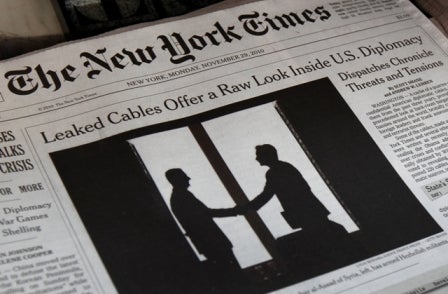
The New York Times has officially banned the practice of “quote approval”
The move comes after the paper’s media correspondent David Carr wrote a column condemning the practice in the paper this week
In his article, ‘The Puppetry of Quotation Approval’, Carr wrote:
It used to be that American businesses either told reporters to go away or told them what they wanted to know. Now, a reporter trying to interview a business source is confronted by a phalanx of factotums, preconditions and sometimes a requirement that quotations be approved. What pops out of that process isn’t exactly news and isn’t exactly a news release, but contains elements of both.
Now the Gray Lady has decided to ban the practice altogether. Here is a copy of the full memo sent to staff (via the New York Observer):
Despite our reporters’ best efforts, we fear that demands for after-the-fact “quote approval” by sources and their press aides have gone too far.
The practice risks giving readers a mistaken impression that we are ceding too much control over a story to our sources. In its most extreme forms, it invites meddling by press aides and others that goes far beyond the traditional negotiations between reporter and source over the terms of an interview.
So starting now, we want to draw a clear line on this. Citing Times policy, reporters should say no if a source demands, as a condition of an interview, that quotes be submitted afterward to the source or a press aide to review, approve or edit.
We understand that talking to sources on background — not for attribution — is often valuable to reporting, and unavoidable. Negotiation over the terms of using quotations, whenever feasible, should be done as part of the same interview — with an “on the record” coda, or with an agreement at the end of the conversation to put some parts on the record.
In some cases, a reporter or editor may decide later, after a background interview has taken place, that we want to push for additional on-the-record quotes. In that situation, where the initiative is ours, this is acceptable. Again, quotes should not be submitted to press aides for approval or edited after the fact.
We realize that at times this approach will make our push for on-the-record quotes even more of a challenge. But in the long run, we think resetting the bar, and making clear that we will not agree to put after-the-fact quote-approval in the hands of press aides, will help in that effort.
We know our reporters face ever-growing obstacles in Washington, on Wall Street and elsewhere. We want to strengthen their hand in pushing back against the quote-approval process, which all of us dislike.
Being able to cite a clear Times policy should aid their efforts and insulate them from some of the pressure they face.
Any potential exceptions to this approach should be discussed with a department head or a masthead editor.
Email pged@pressgazette.co.uk to point out mistakes, provide story tips or send in a letter for publication on our "Letters Page" blog
